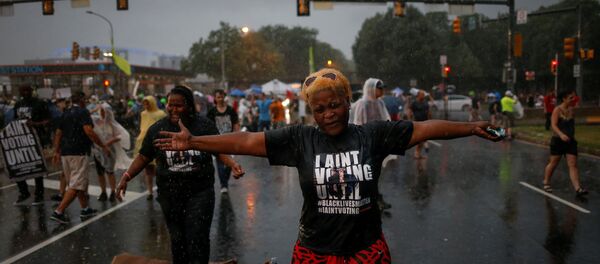Radio Sputnik’s Loud & Clear spoke with Mara Verheyden-Hilliard, executive director of the Partnership for Civil Justice Fund, about the implications this could have on the future of social justice movements.
Citing a report from the Northern California ACLU, the Washington Post described Geofeedia, the social-media-monitoring company that helped police track protesters, " powerful surveillance program that police use for tracking racially charged protests…"
Verheyden-Hilliard explained that companies like Geofeedia are "getting access to what they refer to as ‘firehose feeds’ to people’s data. They in turn take that information and provide data to law enforcement, basically creating a mechanism by which they engage in wholesale massive surveillance as people engage in social protest and police can use them to tap into it."
She said that when people use social-media sites like Facebook, Twitter and Instagram, they often forget that their online activities are being used by corporations that tailor advertising to their interests. This same information is also used to surveil social media users who participate in protests.
"Those of us who are using social media are the product and what these social media entities are doing is selling your information and they want to make money from your information," she stated. "This is now dovetailing with police crackdowns on social justice organizing across the United States, and Geofeedia, much like other private contractors, is looking to reap in some of the hundreds of millions of dollars that’s going to this type of surveillance activity."
Loud & Clear host Brian Becker offered that "advertising isn’t really [social media’s] business, the real business is that they’re collecting information on people, and that information becomes the commodity they’re selling."
Verheyden-Hilliard agreed, and said the companies, “make a lot of money by basically creating an opportunity for mass data mining. And data mining is being used to aggregate all the different things that you’re doing across multiple platforms, from your credit card purchases, to where you may drive, with tag readers that read your license plates, to what you post on multiple different social media platforms, to maybe your location, tracking from your cell phone, to your contact list."
She added that companies like GeoFeedia often secure high-dollar contracts from law-enforcement agencies by pandering to their fearful anti-protest sensibilities.
"The language that they use when talking about social protest is the language that we see from these private security entities over and over again while they’re trying to get new contracts from these police departments," she said, adding, “And it echoes the language and the views of law enforcement in the United States towards social protest. They treat it as if it is a military enemy, giving the greenlight to themselves to combat first-amendment-protected activity, as well as uprising against injustice in the United States, with a full military assault."



